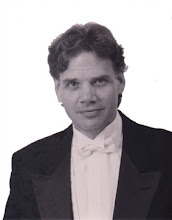The musical world suffered a great
loss this week in the death of Steven Stucky.
As musicians across the country mourned his passing, my thoughts went
back a decade or so to 2005 when we had the privilege of working with him in Grinnell. In the spring of that year, The Grinnell Singers commissioned three new choral works from Stucky, who at that time was the Composer-in Residence with the LA Philharmonic. The commission was offered by a consortium of three choirs: the Grinnell Singers, the Kansas City Chorale, and Seattle Pro Musica, with support from a Meet The Composer grant. I pulled the consortium together and wrote the grant proposal. Our ensemble was the odd one out -- a good college choir displaying pluck perhaps a little beyond what our talent would warrant, grouped together implausibly with two of the country’s finest professional choirs. Imagine our surprise when we found that just about a month after we had arranged for the commission, Stucky won the 2005 Pulitzer Prize for his Second Concerto for Orchestra.

Stucky was gracious toward me as we
discussed the details of the commission, and he was interested to get to know The
Grinnell Singers as much as possible so that he could compose a work that would
work well for all three ensembles. In
our discussions, I had expressed my admiration for Stucky’s “Whispers,” which
had been recorded by Chanticleer. I had
performed “Whispers” with the Grinnell Singers, and though it was, to tell the
truth, just on the edge of our capabilities, in the end it was a richly
satisfying piece to sing, with its deft blending of Byrd’s familiar “Ave Verum
Corpus” and an ethereal setting of Walt Whitman’s poem “Whispers of Heavenly
Death.” Since “Whispers,” a double choir piece, had worked for us, we agreed
that the motets would be for double choir.
When I received the scores toward
the end of summer, I should admit that I had a “what have I gotten myself
into?” moment. “Whispers” calls for
soloists on one of the two choirs, but the pieces Stucky sent were true double
choir pieces, with both choirs meant to be of equal strength. We were going to need a lot of depth and strong
singers throughout the choir. Despite
the high anxiety, in the end, I was enormously proud of how we did with his
pieces, and I’m glad to have played a small part in bringing some fine
music into the world.
Stucky came out to Iowa meet with the choir
and to give a workshop for student composers.
When news came of his passing this week, I received an email from Brian
Cavanagh-Strong one of the students in the choir at the time who is now a
composer, who expressed to me how inspired he was by that visit, by Stucky’s generosity
in his composition lessons, and by having the opportunity to sing in the
premiere of a significant work. During
our spring tour in 2006, we performed two of the pieces, “O vos omnes” and “O
sacrum convivium” in Romania, Bulgaria, and Turkey. In thinking back about this commission, I was
eager to know how the pieces have fared, and whether or not they have entered
the repertoire. Of the three pieces, the
first “O admirabile commercium” is probably the most difficult, and as I did a
quick search for recordings this morning, it appears that choirs have taken it
on less often than the other two. The
rich eight-part writing in the first work is extremely subtle and delicate.
To hear a particularly fine recording of this piece, listen to The Trinity College Choir’s CD, Beyond
All Mortal Dreams which includes an exquisite performance of all
three motets. ACDA members will remember
The Brigham Young University Choir’s
spirited performance of the second piece, “O Sacrum Convivium” at the 2014
National ACDA convention (purchase
recording on Amazon). There’s a also
fine recording of “O Vos
Omnes” posted on YouTube by the Easter Michigan University Choir. When I heard of Stucky’s passing, I went back
to listen to the recording of our 2006 performance of the work. If you’re interested to know how we did, here
are concert recordings from our premiere of the three movements: “O admirabile commercium,” “O sacrum convivium ” and “O
vos omnes.” Thinking back on the
experience, I’m glad that we took the risk and commissioned these works from
this distinguished composer who had a wonderful understanding of how to write
for choir, but who also did not pull his punches in terms of creating
challenges for the performers.

No comments:
Post a Comment